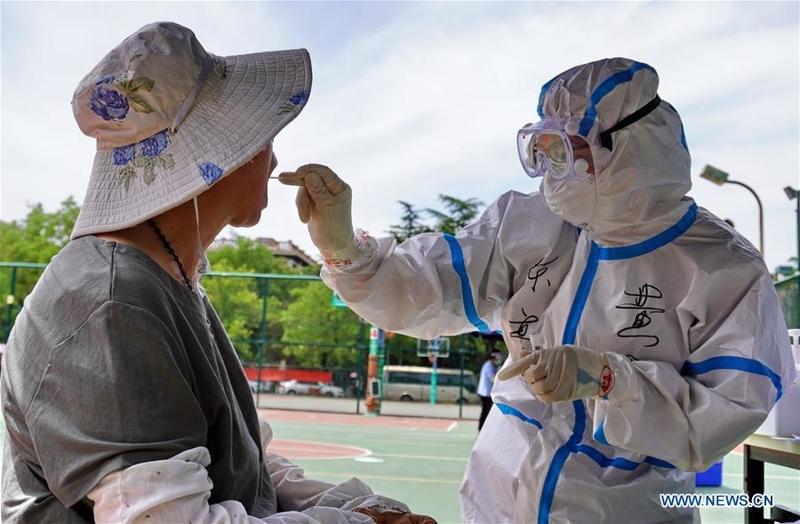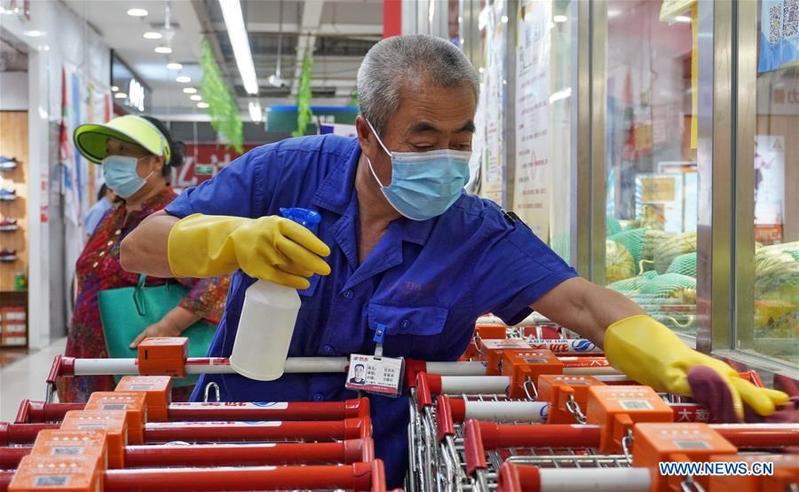 A medical worker (right) takes a swab sample of a resident at a testing site in Fengtai district in Beijing, capital of China, June 15, 2020. (LI XIN / XINHUA)
A medical worker (right) takes a swab sample of a resident at a testing site in Fengtai district in Beijing, capital of China, June 15, 2020. (LI XIN / XINHUA)
BEIJING/WUHAN/SHANGHAI/SHIJIAZHUANG - Beijing has strengthened the management of people and key areas with high risks of being infected by COVID-19, said a Beijing municipal government official on Tuesday, after 27 newly confirmed cases were reported in China's capital on Monday.
The official stressed that high-risk people should suspend their trips out of Beijing and those who have left the city should report to local governments to help curb the spread of the virus. Residential communities around markets where confirmed cases had been reported should be closed.
Schools and public transport in the city have taken measures to curb the spread of the virus. The number of passengers on buses or subways has been limited and all passengers are required to wear masks.
A Beijing municipal government official stressed that high-risk people should suspend their trips out of Beijing
The city plans to roll out sweeping nucleic acid tests for residents living near a produce market in the capital's Xicheng district, after a market employee was confirmed to be infected with COVID-19 on Sunday, an official said.
ALSO READ: Nucleic acid tests for 90,000 as Beijing brings back virus curbs
Li Yi, deputy head of the district government, said at a news conference in Beijing that testing sites would be set up in the neighborhood to cover all residents to facilitate epidemic control measures, including home isolation or quarantine at designated sites.
The move came after local authorities on Sunday shuttered and disinfected Guangwai Tiantao Honglian Produce Market, where an infected employee was found to have traveled to the Xinfadi produce market, a recent hotspot in southern Beijing.
Li said 62 market employees and nearby residents have been put in isolation and tested negative for the novel coronavirus. Seven residential communities near the market have been put on lockdown since 2 am, with volunteers designated to meet their needs for daily supplies.
ALSO READ: Disease control measures enhanced
People who have traveled near Xinfadi market since May 30 are required to contact neighborhood authorities for testing and isolation, he added.
Li pledged all-out efforts to ensure basic needs for people put on isolation in Xicheng district.
Cleanup crews have been set up to take care of waste generated by residents on home isolation, and community workers and volunteers would be deployed to deliver food and other basic supplies to residents, Li said.
People who need renal dialysis and other essential healthcare during the two-week lockdown would be transported to designated hospitals using designated vehicles, he said, adding that neighborhood authorities would also help buy medication for people with chronic diseases.
Efforts will also be made to help graduating students in middle and high schools study at home, he added.
The Beijing Municipal Health Commission reported a total of 106 confirmed COVID-19 cases from Thursday to Monday, with 27 new confirmed cases, two suspected cases and three asymptomatic cases reported on Monday.
READ MORE: WHO: Working closely with China to control pandemic
By Monday, Beijing had reported 526 confirmed domestic cases, including 411 who had been discharged from hospitals after recovery and nine deaths. There were still 106 patients receiving medical treatment, and 10 asymptomatic cases were still under medical observation.
So far, 174 imported cases have been reported in Beijing, with one still hospitalized.
A total of 40 new cases were reported on the mainland Monday, of which 32 were transmitted locally and eight were imported, the National Health Commission said in its daily report
Mainland reports 40 new cases
A total of 40 newly confirmed COVID-19 cases were reported on the Chinese mainland Monday, of which 32 were transmitted locally and eight were imported, the National Health Commission said in its daily report.
Out of all the local cases, 27 were reported in Beijing, four in Hebei province and one in Sichuan province, the commission said.
For the cases in Hebei, the provincial health commission said two of the four cases were close contacts of confirmed COVID-19 cases in Beijing. One of them formerly worked in Beijing's Xinfadi wholesale market while the other one was a case transmitted locally in Hebei.
Out of the eight imported cases, three were reported in Shanghai, three in Guangdong province, one in the Inner Mongolia autonomous region and one in Liaoning province, the commission said.
All of the three imported cases in Shanghai involve Chinese nationals. One of the patients departed from Singapore on June 11 and arrived at the Shanghai Pudong International Airport on the same day. The person exhibited symptoms during isolated observation and later tested positive for COVID-19.
The other two patients both departed from the United States on May 31 and arrived in Shanghai on June 2. Both of them exhibited symptoms during isolated observation and were later confirmed as being with COVID-19.
All the patients are receiving treatment in designated hospitals. A total of 118 close contacts on the same flights as them have been put under quarantine.
Meanwhile, no deaths related to the disease were reported while seven people were discharged from hospitals after recovery Monday, according to the commission.
READ MORE: Experts answer key questions about COVID-19
As of Monday, the overall number of confirmed cases on the mainland had reached 83,221, including 210 patients who were still being treated, with five in severe condition.
Altogether, 78,377 people had been discharged after recovery and 4,634 people had died of the disease, the commission said.
 A worker disinfects trolleys at a supermarket in Beijing's Fengtai district on June 15, 2020. (LI XIN / XINHUA)
A worker disinfects trolleys at a supermarket in Beijing's Fengtai district on June 15, 2020. (LI XIN / XINHUA)
By the end of Monday, the mainland had reported a total of 1,845 imported cases. Out of those cases, 1,752 had been discharged from hospitals after recovery, and 93 remained hospitalized. No deaths from imported cases had been reported.
The commission said three new suspected cases were reported Monday, bringing the total number of suspected cases to four.
According to the commission, 4,340 close contacts were still under medical observation after 225 people were released from medical observation Monday.
By the end of Monday, the mainland had reported a total of 1,845 imported cases, of which 1,752 had been discharged from hospitals while 93 remained hospitalized
Also on Monday, six new asymptomatic cases, including two imported from abroad, were reported on the mainland. No asymptomatic case was re-categorized as a confirmed case. A total of eight asymptomatic cases, including one imported case, were released from medical observation, according to the commission.
The commission said 110 asymptomatic cases, including 63 imported from abroad, were still under medical observation.
ALSO READ: Salmon called unlikely source of coronavirus
Hubei
No new confirmed or suspected COVID-19 cases were reported in central China's Hubei province on Monday, the provincial health commission said Tuesday.
By Monday, the province still had three asymptomatic cases under medical observation, after three such cases were released from quarantine Monday.
The last three asymptomatic cases in the provincial capital Wuhan were released from medical observation on Monday after results from nucleic acid tests came back negative.
Wuhan's health commission said Tuesday the three cases tested negative in two consecutive nucleic acid tests before being discharged from medical observation.
The commission said that the city had no asymptomatic cases as of Monday, and there were no more close contacts under medical observation. There were also no existing confirmed or suspected cases.
By Monday, Hubei had reported a total of 68,135 confirmed COVID-19 cases, 4,512 deaths, and 63,623 recoveries.
Shanghai
The Shanghai municipal government on Tuesday reiterated its strict measures to quarantine visitors and returnees from the country’s high- and medium-risk areas to minimize the spread of COVID-19.
According to Wu Jinglei, director of the Shanghai Municipal Health Commission, all those entering Shanghai from domestic high-risk areas will be required to undergo 14 days of quarantine at hotels and two nucleic acid tests.
Those from medium-risk areas within the country can choose to undergo a 14-day home quarantine if they have a residence in the city. This group of individuals must also undergo two nucleic acid tests.
“Such individuals must report to their local neighborhood committees and their employers or the hotels where they reside in within 12 hours after arrival in Shanghai,” Wu said.
As of Monday, a total of 354 imported cases and 341 local cases had been reported in the municipality.
Hebei
In addition to the four new local cases reported, one new imported asymptomatic case was also reported in Hebei, according to the provincial health commission on Tuesday.
By Monday, there were 150 people who had close contact with the confirmed cases under medical observation in the province neighboring Beijing. There were also five asymptomatic cases under medical observation, of which four were imported cases.
HK, Macao, Taiwan
By Monday, 1,112 confirmed cases, including four deaths, had been reported in the Hong Kong Special Administrative Region (SAR), 45 confirmed cases in the Macao SAR, and 445 in Taiwan, including seven deaths.
A total of 1,067 patients in the Hong Kong SAR, 45 in the Macao SAR, and 433 in Taiwan had been discharged from hospitals after recovery.


